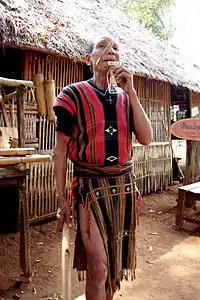Katang people
The Katang (Kataang) are an ethnic group predominantly living in Laos. A few live elsewhere in Southeast Asia. In 2015 there were 144,255 living in Laos, making them one of the largest subgroups of the Lao Theung and one of the largest true ethnic groups in the country. Most live in Savannakhet, Saravan, and Champassack.[1]
| Total population | |
|---|---|
| 144,255 (2015)[1] | |
| Regions with significant populations | |
| Laos | |
| Languages | |
| Katang, Lao | |
| Religion | |
| Animism, Theravada Buddhism |

Culture
They are one of the few Lao Theung people that do not live in houses on stilts or in trees, but rather in long wooden houses.[2] Whenever a Katang man marries a woman, he will add a room to the house for his new family. One of these wooden longhouses is 328 feet long and tourists can still see it just north of Saravan City.
Another old Katang tradition for both men and women is to pierce their ears and put a bamboo tube in the hole to stretch out their lobes. This tradition has all but died out.
The Katang engage in crop rotation as their common agricultural practice.[3] Many Katang also engage in irrigation and slash-and-burn agriculture.[2]
Most Katang follow old ethnic beliefs and many people who do this also follow Buddhism. Some Buddhist festivals are commonly celebrated by the Katang.[3] Traditional Katang animism includes a belief in many forest spirits and many taboos meant to avoid disturbing them have developed over the centuies. One of the most revered spirits includes the house spirit which is said to inhabit every house.[4]
References
- "Results of Population and Housing Census 2015" (PDF). Lao Statistics Bureau. Retrieved 1 May 2020.
- Stuart-Fox, Martin (2008). Historical Dictionary of Laos. Scarecrow Press. p. 147. ISBN 978-0-8108-6411-5.
- Communities and Forest Management in Southeast Asia. IUCN. 1999.
- Planet, Lonely; Morgan, Kate; Bewer, Tim; Ray, Nick; Waters, Richard (2017). Lonely Planet Laos. Lonely Planet. ISBN 978-1-78701-061-1.
